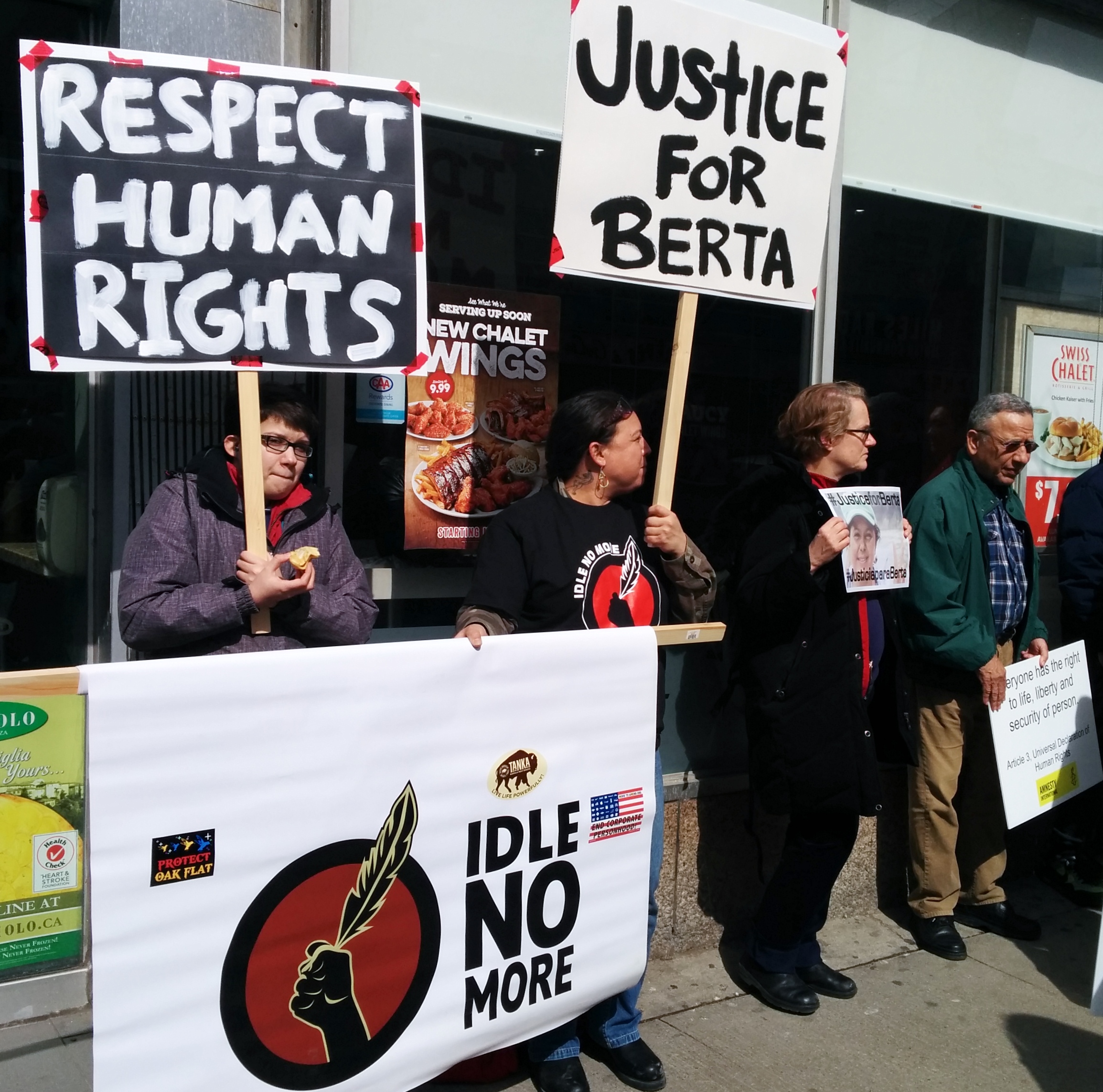Like this article? rabble is reader-supported journalism. Chip in to keep stories like these coming.
TORONTO – Dozens of demonstrators gathered outside the constituent office of the Ministry of International Trade in Toronto on March 11 to condemn Canada’s commercial involvement with Honduras, where an award-winning Indigenous environmentalist was murdered a week prior.
On March 3, armed men broke in and shot Berta Cáceres to death, a Lenca woman and co-founder of the National Council of Popular and Indigenous Organizations of Honduras (COPINH). Cáceres, who was 43, had been opposing mega-development projects threatening Indigenous communities for more than 20 years.
The coalition of civil societies leading the demonstration demanded that the Canadian government, which entered into a Free Trade Agreement with Honduras in 2013, condemn the murder. An open letter signed by over 80 organizations from across Canada demanding an independent international investigation involving the Inter- American Commission on Human Rights was also delivered to ministry clerks. NDP members Hélène Laverdière, critic for foreign affairs and Cheryl Hardcastle, part of the Subcommittee for International Human Rights, were two of the signatories.
“Change happens when citizens ban together and demand it,” said Katarina Kahnert-Wolchak, a member of The Delta Now, a grassroots group led by students out of York University working in Solidarity with Honduran Indigenous-Garifuna communities on genocide and land rights issues.
“So we’re demanding Canadian political action. We must hold our political representation accountable for the ramifications of their decisions. That’s why solidarity is so important.”
The group plans to begin a letter- and email-writing campaign targeted at politicians supporting the “oppressive Honduran state.”
Cáceres, who won the prestigious Goldman Environmental Prize in 2015, had been one of the leading voices of Indigenous resistance in Honduras and Central America.
Since 2006, COPINH and the Rio Blanco community began protesting peacefully against the Agua Zarca hydroelectric generation project on the Gualcarque River, in western Honduras. As of today, the project has been effectively brought to a halt, with stakeholders citing the ongoing resistance and turmoil as the main reasons, including the murder of fellow COPINH leader Tomas Garcia.
Cáceres also led protests against the 2009 parliamentary coup d’etat which ousted the democratically elected government of Manuel Zelaya.
Despite all this, Stephen Harper’s conservatives signed the FTA with a country notoriously known as the “murder capital of the world” and marred by human rights violations. Current Liberal Prime Minister Justin Trudeau has thus far also failed to address any of these issues, while Honduran authorities are asking to be included in the controversial Trans-Pacific Partnership.
“I just want you to realize how negative all these international trade deals are for Indigenous people,” said Tori Cress, an Anishinaabe of the Beausoleil First Nation and Idle No More organizer. “No consultation, no consent in any one of these continents where indigenous people have been colonized. Each one of these Free Trade Agreements directly affect us first. It’s our stolen lands and territories that we’re trying to protect.”
Investigation is a ‘catalogue of failures’
Honduran authorities claim they are working with American law enforcement agencies, including the FBI, to investigate the murder, according to a New Yorker article.
But critics are calling for an impartial investigation, citing concerns over the objectivity of the one being led by the Honduran government.
“The investigation undertaken by Honduras, to date, has been a catalogue of failures that seems aimed at criminalizing COPINH and looking everywhere but the source of the threat” said Marilyn McKim a member of Amnesty International Canada, present at the Toronto rally.
The organization is also demanding that Gustavo Castro Soto, a Mexican colleague of Cáceres who was shot but survived and is now the only eye witness to the crime, be allowed to return home. Honduran authorities stopped Soto, a sociologist who at the time was with the Mexican ambassador, at the airport after issuing a migratory alert preventing him from leaving the country. Critics, and Soto himself, worry for his safety. Last week, he sent a letter to a local Honduran newspaper stating that he believed investigators had “tampered” with the crime scene.
“Gustavo and Berta have never failed to raise their voices for rights, dignity and justice. Silence was never an option. Silence cannot be an option for us either,” said Marilyn McKim , adding that Soto has collaborated “repeatedly … with the investigation and given testimony.”
Cáceres’ legacy
The murder of one of the world’s leading defenders of earth’s natural resources has sparked outrage. It is strengthening Indigenous and civil society movements, and it’s inspiring demonstrators to deepen their struggles.
“Berta’s assassination have left many of us with an important call for action,” said Heryka Miranda, a colleague of both Cáceres and Soto.
“What is it that I, that we, would sacrifice for the planet, for the waters of the earth of humanity? Berta is calling on us as a global family to wake up, because we are running out of time. I am coming out of the shadows … to honour (her), to hold my government accountable using whatever power I may have, using my privilege as a Canadian and United States citizen to continue (her) legacy.”
People who want to take action for Soto are encouraged to send a letter to the Honduras embassy in Canada. For full address details, please go here. They can also contact The Delta Now, one of the grassroots groups at the rally, for more information on their own letter-writing campaign.
Organizations who wish to add their names to the open letter can contact Raul Burbano, at Common Frontiers, at burbano[at]rogers.com
Like this article? rabble is reader-supported journalism. Chip in to keep stories like these coming.



